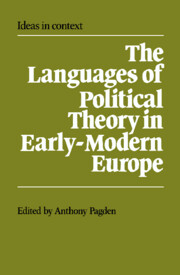Book contents
- Frontmatter
- Contents
- Notes on contributors
- Acknowledgements
- Introduction
- 1 The concept of a language and the métier d'historien: some considerations on practice
- PART I
- PART II
- 6 Sir Thomas More's Utopia and the language of Renaissance humanism
- 7 The concept of ordre and the language of classical republicanism in Jean-Jacques Rousseau
- 8 The language of seventeenth-century republicanism in the United Provinces: Dutch or European?
- 9 The civil religion of James Harrington
- PART III
- PART IV
- Index
- Ideas in Context
7 - The concept of ordre and the language of classical republicanism in Jean-Jacques Rousseau
Published online by Cambridge University Press: 04 September 2009
- Frontmatter
- Contents
- Notes on contributors
- Acknowledgements
- Introduction
- 1 The concept of a language and the métier d'historien: some considerations on practice
- PART I
- PART II
- 6 Sir Thomas More's Utopia and the language of Renaissance humanism
- 7 The concept of ordre and the language of classical republicanism in Jean-Jacques Rousseau
- 8 The language of seventeenth-century republicanism in the United Provinces: Dutch or European?
- 9 The civil religion of James Harrington
- PART III
- PART IV
- Index
- Ideas in Context
Summary
This essay has two principal objectives. In the first place I shall offer an analysis of Rousseau's concept of ‘political order’, and in the second I shall attempt to show how that concept was indebted to the language of classical and modern republicanism.
The term ordre occupies a central place in all of Rousseau's writings, and is used to describe a wide range of different concepts. There is the metaphysical order, the natural order, the moral order and – what I shall be almost wholly concerned with in this essay – the political order. Rousseau uses the term in two distinct senses, both of which derive from the philosophical language of his day. In the first sense it is broadly synonymous with ‘harmony’ or ‘concord’, the co-operation which must exist between the parts that make up any whole if it is to attain some common end. The antithesis of this is, of course, internal conflict, the tendency of the various parts to pursue individual and separate ends. In the second sense, order is used to mean ‘the just and proper disposition’, the correct location, that is, of each part of any whole on a scale of values or of degrees of perfection. The antithesis of this is an unjust or incorrect scale or hierarchy in which the best are at the bottom and the worst at the top.
- Type
- Chapter
- Information
- The Languages of Political Theory in Early-Modern Europe , pp. 159 - 178Publisher: Cambridge University PressPrint publication year: 1987
- 2
- Cited by



